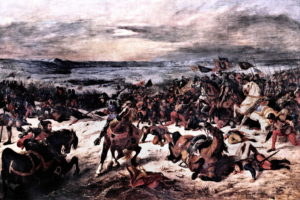Letter from La Vigie, dated 29 May 2024

Paris-Warsaw: Prelude or waltz?
Poland has traditionally had difficulties with its two neighbours, Russia and Germany. The war in Ukraine is reshuffling the cards in its strategic equation and prompting it to take an interest in the new French discourse: is this the prelude to a lasting understanding or just a waltz?
To read the article, click here
A funeral dirge for international law
The decision by Karim Khan, the ICC prosecutor, to ask for arrest warrants to be issued for Netanyahu and his defence minister has provoked strong reactions in the United States. Based on morality rather than law, they threaten one of the foundations of the international order, justifying in hindsight all the criticism of a law that would only target countries that are not aligned with the United States. If the threats against the ICC materialise, it could be the death knell of international law.
To read the article, click here
Lorgnette: the meaning of war
Soldiers are starting to write: what was still the exception twenty years ago is now becoming commonplace. But let’s take a look at the themes covered in these works: history, ethics or personal accounts, in most cases. In the latter case, the war is described as an experience. The authors show its violence, its injustice and the trauma it caused. France, for example, has been at war for thirty years without realising it, because its soldiers have been under fire (here).
Of course, the reader is left in awe of the examples given, the underlying heroism, and the moral and psychological dimension of war. But they are also bothered by a major omission, that of the political dimension of war. War is not only the work of those who wage it. War has a cause before it has a meaning. It is the work of a society before it is the work of the men who lead it. War is not war because it is an experience, it is war because it is first and foremost a political object. France was not at war because it did not think of itself as being at war. This is, moreover, the criticism we have regularly levelled at recent external operations in which the enemy was not identified.
This confusion remains embarrassing.
JOVPN
Subscribers: click directly on the links to read online or download the pdf issue (here), always with your login/password. New readers: read the article by issue, by clicking on each article (€2.5), or subscribe (discovery subscription €17, annual subscription €70, orga. subscription €300 excl. tax): here, the different options.
Photo credit: europeancouncilpresident on VisualHunt.com



